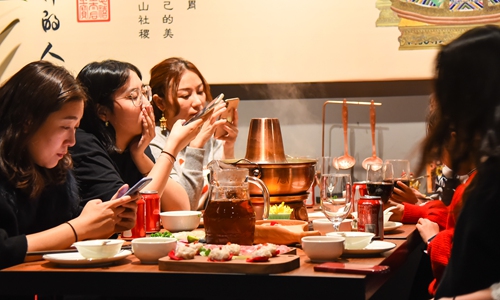HOME >> SOURCE
Restaurants hope for rebound after novel coronavirus dies, call for support policies
By Ma Jingjing Source:Global Times Published: 2020/2/2 15:55:05

File photo: Chinese diners enjoy hotpot in a restaurant in Beijing. Photo: IC
China's catering industry is expected to see a rebound following an end of the coronavirus onslaught, although explosive growth is unlikely due to lingering fear, industry insiders said on Sunday as they called for government help to sustain the sector.
"We may see a recovery once the virus disappears, as friends and colleagues may want to get together after being isolated for a long period," Liu Renjun, manager of Hunan Xiangjun Catering Co, told the Global Times on Sunday.
Cao Yong, a 30-something Wuhan resident, said, "I hope we can beat the coronavirus soon. I can't wait to rush out for a slap-up meal."
Behind these comments lie China's growing reliance on restaurants with the emergence of food delivery platforms such as Meituan Dianping and Eleme.com.
According to data from the China Hospitality Association, China's catering revenue reached 4.67 trillion yuan ($673 billion) in 2019, up 9.4 percent year-on-year.
Some 30 million people are engaged in the industry, with about 1.6 million jobs added each year, according to the association. Nevertheless, an urgent problem China's millions of restaurants currently face is how to survive the next couple of months if the virus is not brought under effective control.
The novel coronavirus has dealt a heavier blow to the industry than SARS in 2003, Liu said. "Generally, January and February are peak periods for restaurants to accumulate cash to cope with a slack time in March and April. Thus, compared with the outbreak of SARS in March 2003, the current shock will result in many restaurants being short of enough cash," he said.
Liu has six restaurants specializing in banquets in Yiyang city, Central China's Hunan Province, and he has more than 500 employees. After the outbreak of the coronavirus, 7,100 banquets were canceled and the restaurants were temporarily shut down, but the company is still paying its employees.
Liu's case is just one among millions. Feng Jin, founder of mcroom.cn, a self-service teahouse platform, said most of the company's 10 stores in Beijing have suspended operations, while another four stores delayed opening.
"Rents make up most of our costs, we see lower losses than restaurants, but the impact is still big," Feng said, noting that his company's expansion will be impeded, with the opening of another four stores already delayed.
"The coronavirus epidemic is more damaging [to the catering sector] than SARS in 2003. Catering industry revenue across China is expected to tumble more than 25 percent in January and February," Zhao Jingqiao, an expert specializing in the sector at the Chinese Academy of Social Sciences, told the Global Times.
During the worst time in 2003, China's catering industry saw overall revenue slump 15.5 percent year-on-year in May, but it quickly rebounded to an expansion of 3.4 percent in June after SARS was brought under control, official data showed.
Some restaurants are trying to mitigate the losses by finding other means to keep going, for example by stepping up food delivery services or selling semi-finished products directly to communities. For example, Beijing-based Meizhou Dongpo Restaurant, which specializes in Sichuan cuisine, is selling vegetables, fruit, semi-finished and finished products to urban residents in communities near its outlets.
Industry insiders and the expert were united in calling for the government to swiftly release support policies, such as cuts in taxes and venue rentals, to ensure the stability of the sector and its millions of workers.
"This year will be one of life-or-death for most small and medium-sized restaurants in China," Liu commented.
Posted in: INDUSTRIES